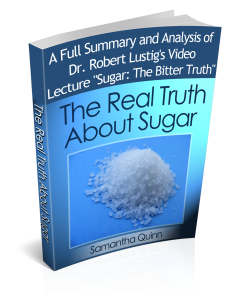As Gary Taubes says in his New York Times Magazine article “Is Sugar Toxic?” (April 2011), “Suggesting that sugar might kill us is what zealots do.” He then explains his reasons for taking Dr. Robert Lustig and his “Sugar: The Bitter Truth” video lecture seriously. He emphasizes Lustig’s credentials as a nationally-recognized authority on obesity in the field of neuroendocrinology, and notes that Lustig has compelling evidence on sugar and health effects that deserves discussion.
Taubes frames this discussion in the serious manner that it warrants. It’s one thing, he argues, to heed the advice of nutritionists who recommend more fruits and veggies or less of one thing or another—or even less food altogether. It’s something else to say that the sweets we give ourselves and our children may be toxic—despite the intentions of love that go with the sweets. This point of view becomes especially poignant when we consider the very real possibility that sugar consumption leads to cancer. With that in mind, the sugar and cancer relationship has to be seriously examined.
The short story here is this: insulin resistance, which has been identified as the fundamental issue in obesity, is also considered the fundamental defect in Type 2 Diabetes (common to obese persons) and heart disease. The link between sugar and insulin resistance is also well known, and this topic forms much of the discussion in “Sugar: The Bitter Truth”—especially regarding how sugars are metabolized in the body. Fructose is the main culprit, it seems, since only the liver can metabolize fructose, and lab studies with rats and mice have proven that when fructose arrives at the liver in sufficient amounts and with enough speed, the liver will convert much of it to fat. This then brings about insulin resistance.
So what about cancer? Researchers believe that insulin resistance may also be the underlying problem in cancer. Taubes reports that most researchers now agree that the connection between increasing cancer rates and the Western diet or lifestyle comes about through cancer’s association with metabolic syndrome, Type 2 Diabetes and obesity. He notes that cancer researchers have shown that insulin and a hormone known as insulin-like growth factor promote tumor growth. The connections between sugar and cancer are therefore quite real.
Taubes refers to researcher Craig Thompson, now president of New York’s Memorial Sloan-Kettering Cancer Center, who believes that cancer cells in many cancers need insulin to grow and multiply. Insulin resistance causes our bodies to secrete more insulin, and this elevated insulin appears to be a common step in many cancers, especially breast and colon cancers. Taubes further reports that the developing tumors of up to 80% of all cancers are fed by mutations or other factors that copy or seek to increase the effects of insulin.
Recognizing the link between sugar and insulin resistance means recognizing the link between sugar consumption and cancer. Taubes quotes Thompson: “I have eliminated refined sugar from my diet and eat as little as I possibly can because I believe ultimately it’s something I can do to decrease my risk of cancer.”
We should do the same. Refined sugar, especially when delivered in large quantities and with relatively great speed in the form of soft drinks and juices, should absolutely be avoided. Sugar and cancer, unfortunately, is something we need to be aware of.
Samantha Quinn





